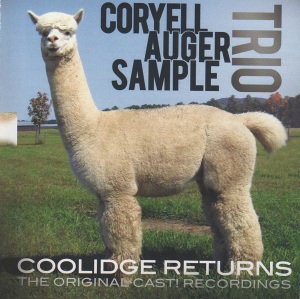Tenor saxophonist Steve Marcus introduced guitarist Larry Coryell to Gary Burton, master of the vibraphone, sometime in 1966. I always thought it was the other way around, i.e. Burton saw Coryell in The Free Spirits in New York, which he actually did, and then the Coryell-Marcus association came later.
 According to notes from the reissue of Marcus’ album Tomorrow Never Knows, he already knew Coryell through mutual friend and pianist Mike Nock, who lived with Coryell in Greenwich Village. After Burton saw Coryell play in 1966, he asked him to join his quartet with drummer Roy Haynes and bassist Steve Swallow. What resulted was a truly inspiring combination of players, who played jazz with a difference. They were all well-schooled in the bop and contemporary jazz traditions but they also skirted rock and pop territory with rhythms and feels you just didn’t find in jazz.
According to notes from the reissue of Marcus’ album Tomorrow Never Knows, he already knew Coryell through mutual friend and pianist Mike Nock, who lived with Coryell in Greenwich Village. After Burton saw Coryell play in 1966, he asked him to join his quartet with drummer Roy Haynes and bassist Steve Swallow. What resulted was a truly inspiring combination of players, who played jazz with a difference. They were all well-schooled in the bop and contemporary jazz traditions but they also skirted rock and pop territory with rhythms and feels you just didn’t find in jazz.
The quartet produced the landmark Duster, then Bob Moses replaced Haynes and the group recorded two more albums, Lofty Fake Anagram, which pushed further into rock territory, and the exquisite Live at Carnegie Hall. Coryell was incorporating rock tendencies more than anyone in the group with a fierce, biting tone at times and the use of feedback and rock phrasing juxtaposed with his masterful jazz leanings.
Shortly after Coryell left the quartet, he joined Marcus for two of three albums that were among the first to fuse rock and jazz. The records featured jazz-schooled players, who loved rock and pop as much as the jazz tradition they came up in, and showed them displaying more of a rock attitude than ever before for jazz players. These albums are certainly among the first genuine examples of the fusion of the two genres.
The first, Tomorrow Never Knows in 1968, featured the Beatles psychedelic title track, along with another Fab Four offering Rain, the Byrds’ Eight Miles High, Mellow Yellow by Donovan and two other tracks, including a Coryell composition, Half A Heart. A fine album with outstanding interpretations.
Then came Count’s Rock Band, the peak of this triptych and our Hidden Treasure No. 8 in ’69, followed by the mostly forgettable The Lord’s Prayer, sans Coryell, also in ’69. According to Marcus’ notes, Gary Burton, who was a neighbor of Marcus’, actually produced the first album, but when it landed on Herbie Mann’s new imprint Vortex, distributed by ATCO, Mann got credit for production on all three outings. Joining Marcus and Coryell on Count’s Rock Band and Tomorrow are Moses on drums, Nock on piano and Chris Hills on bass.
Count’s Rock Band follows the pattern of Tomorrow and includes covers of Simon & Garfunkel’s Scarborough Fair with Marcus on soprano sax and The Stones’ Back Street Girl. But the two Hills compositions, Theresa’s Blues and Ooh Baby are easily the album’s highlights and make this record a gem. Continue reading From The Vaults: Hidden Treasure No. 8

 In early 1970 Bruce put an intriguing and accomplished band together to tour in support of Songs For A Tailor. Called Jack Bruce & Friends, I noticed they were to play at the Fillmore East the weekend of January 30-31 as the opening act for Mountain! Leslie West’s group, at the time, was of course doing very well commercially in the wake left by Cream, but it startled and somewhat annoyed me that Bruce would actually be opening for them.
In early 1970 Bruce put an intriguing and accomplished band together to tour in support of Songs For A Tailor. Called Jack Bruce & Friends, I noticed they were to play at the Fillmore East the weekend of January 30-31 as the opening act for Mountain! Leslie West’s group, at the time, was of course doing very well commercially in the wake left by Cream, but it startled and somewhat annoyed me that Bruce would actually be opening for them. Guitarist Julian Coryell is the son of jazz-rock pioneer and legend Larry Coryell, Karma Auger’s dad is Brian Auger, who played with Julie Driscoll and led the Trinity and Oblivion Express in the ’60s and ’70s, and Nicklas Sample is the son of Joe Sample, the keyboard player from L.A. based fusion band The Crusaders.
Guitarist Julian Coryell is the son of jazz-rock pioneer and legend Larry Coryell, Karma Auger’s dad is Brian Auger, who played with Julie Driscoll and led the Trinity and Oblivion Express in the ’60s and ’70s, and Nicklas Sample is the son of Joe Sample, the keyboard player from L.A. based fusion band The Crusaders.